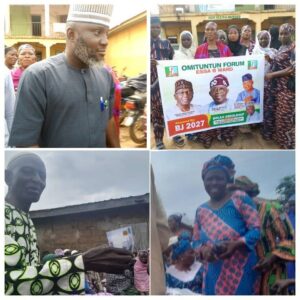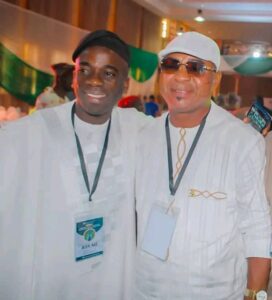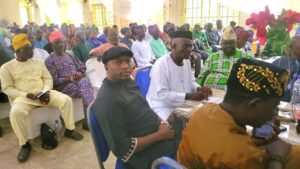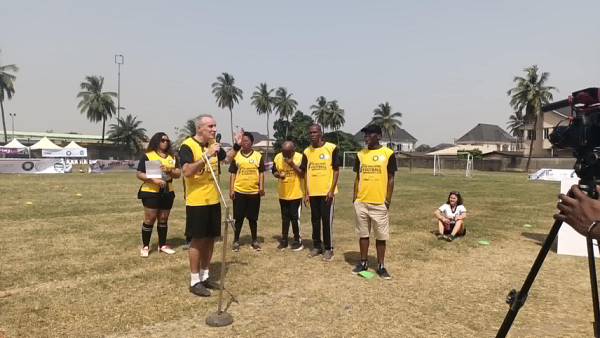
In line with its mission to consistently integrate physical activity into therapy for persons with Parkinson’s Disease, Parkinson’s Africa has collaborated with the Adewunmi Desalu Parkinson’s Foundation for the second edition of the Walking Football for Parkinson Disease Tournament.
The match tournament, which was primarily sponsored by Vitol Foundation, was held at the Eagles Club, Surulere, during the weekend and saw the participation of over fifteen teams which comprised of corporate organisations, Parkinson’s Disease advocates and persons living with Parkinson’s Disease.
The event was also supported by First Bank of Nigeria (Limited), and corporate organisations such as AIICO Multishield Nigeria Limited, Asharami Synergy, Airtel Nigeria, Fan Milk Plc., Halogen-Group, LES Energy, PFL Engineering, Reliance HMO, and StreSERT were represented by teams. The Physiotherapy Department of the
Founder and the Chair of Trustees, Parkinson’s Africa, Mrs. Omotola Thomas, said the organisation is leading a mission to support and empower those affected by the condition. With initiatives aimed at raising awareness, providing education, and improving access to medication, she shared that Parkinson’s Africa is making strides in transforming the narrative around this often-misunderstood disease.
One of the organisation’s most innovative campaigns involves the promotion of walking football, a modified version of the sport designed to accommodate individuals with balance and coordination challenges—common symptoms of Parkinson’s disease.
“Walking football is more accessible and suitable for people with Parkinson’s,” explained Thomas. “It provides the necessary physical exercise without the high-impact movements of regular football. It also encourages dual tasking, which helps stimulate brain activity by requiring players to think about walking and playing simultaneously.”
According to Thomas, the idea for this unique approach came from Parkinson’s Africa’s Chief Executive Officer, Tania Park, a former professional footballer. “Tania recognised that exercise is crucial for managing Parkinson’s symptoms and saw an opportunity to integrate physical activity with awareness campaigns.”
“This initiative combines the benefits of exercise with spreading awareness in a fun and engaging way,” Thomas said. Walking football has proven to be an effective medium for reaching diverse audiences while providing therapeutic benefits to participants.
Parkinson’s Africa also collaborates with local organizations and support groups to extend its impact. Throughout the year, and particularly in April during World Parkinson’s Day, the organization sponsors awareness campaigns and educational webinars.
“April 11th is a significant date for us,” Thomas emphasized. “It’s an opportunity to unite communities across Africa to highlight the challenges of living with Parkinson’s and promote solutions.”
Read Also: NFF congratulates Felix Owolabi on 70th anniversary
By blending creativity with compassion, Parkinson’s Africa is making a meaningful difference. Through walking football and other initiatives, the organization is not only empowering patients but also fostering a sense of community and hope.
Head of Programs at the Adewunmi Desalu Parkinson’s Foundation, John Akinola, said that the walking football was inspired by practices already in place in the Western world, where football is used to support Parkinson’s patients. According to him, the adaptation has proven to be highly effective, fostering enthusiasm and engagement among persons living with Parkinson.
“From what we have seen here so far, the support for the tournament has been remarkable,” Akinola said. “Last year, we had fewer than eight teams participating. This year, that number has nearly tripled, reaching about 20 teams, including corporate organizations and volunteers. The awareness about Parkinson’s in Nigeria is growing, and we expect that by next year, we could see participation from up to 50 teams.”
Parkinson’s Disease, a chronic condition that impacts motor skills and quality of life, poses significant challenges. Akinola emphasized that while the disease cannot be controlled, maintaining an active lifestyle can slow its progression. “It’s not the end of the road,” he reassured. “Parkinson’s chose you, but you can choose to live better. You can advocate, stay active, and not let Parkinson’s ground you.”
Speaking on the side, an ambassador for Parkinson walking football, Joe Gregory, who travelled to Nigeria to specifically attend the tournament, shared his inspiring journey of rediscovering passion and purpose through walking football after being diagnosed with Parkinson’s disease five and a half years ago and his fears that he would never play football again,
“Since my diagnosis, I’ve played two to three times a week and have even participated in events in many countries. Coming to Nigeria has been a fantastic experience.”
Walking football, which started in England three years ago with just six teams, has grown significantly. Today, Gregory explained that there are approximately 30 to 40 teams across England, including an international team he plays for. The success of the initiative, exemplified by the recent Cure Parkinson’s Cup with 20 teams, has encouraged him to advocate for its expansion to other countries, including Nigeria.
“I would absolutely recommend this for Nigeria,” Gregory stated. “It’s a great opportunity to not only help individuals with Parkinson’s stay active but to build a supportive community. I would be happy to help develop this initiative in Nigeria and even create an international team that could play in England at Saint George’s Park, home of the English FA.”
Following an exciting match, Asharami Synergy won the 2024 tournament cup, with Steady Striders coming second and Physio Boyz in third. In the Penalty Shootout Rounds, the winners were the Vitol Foundation, First Bank of Nigeria (Limited) and New Birth.
The event was a delightful experience for the attendees, teams and persons living with Parkinson’s and their caregivers. It demonstrated the positive impact of community-driven exercises and underscored the importance of physical activity as a means to improve the lives of those affected, offering hope and motivation to persevere despite the diagnosis.


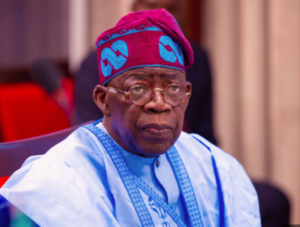
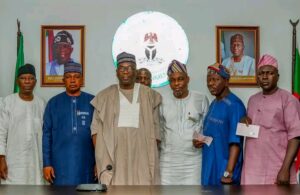
![[PHOTOS] MOK Movement Disburses ₦300,000, Distributes Food Items to the Aged in Offa During Weekly Empowerment Programme](https://newsbulletin.com.ng/wp-content/uploads/2025/10/FB_IMG_1760379043455-300x300.jpg)
